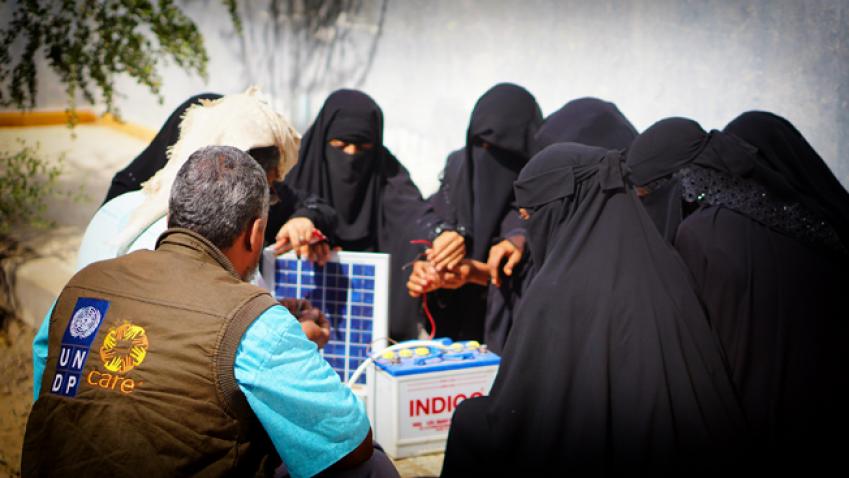Even before the outbreak of a deadly conflict, Yemen was already one of the world’s most energy‑insecure and water-scarce countries, with most of the country lacking access to sustainable energy. The ongoing war has made the situation even worse. The Enhanced Rural Resilience in Yemen (ERRY) project aimed to change that by empowering marginalized communities with the power of the sun.
The intervention supported displaced persons, women and young people to establish decentralized solar energy systems that would help them generate a stable income and provide them new professional skills, while producing accessible and affordable solar energy.
Beneficiaries of the project received income through short-term cash-for-work activities while rehabilitating community assets, such as roads leading to the market, health facilities and schools, as well as improving market centers. After completing that phase, the beneficiaries received basic and advanced training in establishing and running solar micro-businesses.
The graduates of these training sessions then developed business proposals for community shops with affordable solar items, such as lanterns or charging equipment, and for solar micro-grids to provide electricity to poor households and local businesses.
The initiative was directed specifically towards women and youth. Selected individuals were also trained and certified as solar technicians to support the solar micro-businesses and solar micro-grid. The project participants also received a seed grant to establish their businesses.
The project helped 160 previously unemployed people, half of which are women, establish solar micro-businesses. It has also allowed 40 other women and young people to set up solar micro-grids, which now generate a stable income for the project participants. In addition to clean energy and employment opportunities, the project has also successfully shifted the attitudes of the local communities by placing women in charge of their own businesses.
What are the inspiring breakthroughs and success stories that illustrate SDG implementation? What are the good practices that can be replicated and scaled up? What are the gaps and constraints and how should we address them? Looking ahead, what steps should we take to accelerate progress? To help answer these and other questions, UN DESA gathered more than 600 good SDG practices in a searchable online database. Be inspired by SDG solutions that work: https://sustainabledevelopment.un.org/partnerships/goodpractices
About UN DESA
UN DESA Products
UN DESA Divisions
- Office of Intergovernmental Support and Coordination for Sustainable Development
- Division for Sustainable Development Goals
- Population Division
- Division for Public Institutions and Digital Government
- Financing for Sustainable Development Office
- Division for Inclusive Social Development
- Statistics Division
- Economic Analysis and Policy Division
- United Nations Forum on Forests
- Capacity Development Programme Management Office

